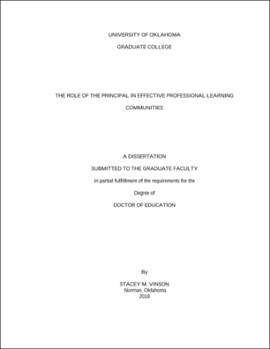| dc.contributor.advisor | Forsyth, Patrick | |
| dc.contributor.author | Vinson, Stacey | |
| dc.date.accessioned | 2018-04-16T16:04:29Z | |
| dc.date.available | 2018-04-16T16:04:29Z | |
| dc.date.issued | 2018-05-11 | |
| dc.identifier.uri | https://hdl.handle.net/11244/299327 | |
| dc.description.abstract | To meet the demands of increased student achievement, schools are implementing professional learning communities as a means of driving school improvement efforts. For the professional learning community structure to be effective, what conditions must exist in the school, and what is the principal’s role in creating those conditions? This study examines the effects of transformational leadership, faculty trust in the district, faculty trust in the principal, faculty trust in colleagues, and program coherence on the effectiveness of professional learning communities. In this study, transformational leadership, trust, and program coherence were all found to have statistically significant relationships to professional learning community effectiveness, with program coherence emerging as the most important variable. | en_US |
| dc.language | en_US | en_US |
| dc.subject | professional learning communities, program coherence, trust, transformational leadership | en_US |
| dc.title | The Role of the Principal in Professional Learning Communities | en_US |
| dc.contributor.committeeMember | Adams, Curt | |
| dc.contributor.committeeMember | Edwards, Beverly | |
| dc.contributor.committeeMember | Garn, Gregg | |
| dc.contributor.committeeMember | Randle, Rodger | |
| dc.date.manuscript | 2018-04-04 | |
| dc.thesis.degree | Ed.D. | en_US |
| ou.group | Jeannine Rainbolt College of Education::Department of Educational Leadership and Policy Studies | en_US |
